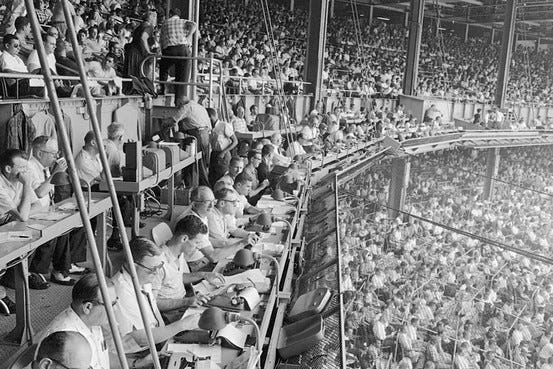I’m starting to think I might not make a great sports opinion columnist. The entire job of a sports opinion columnist, really, is to always find something fresh and novel to say, and to fake one if you can’t. The Mets need to make a blockbuster trade! Here’s my plan to fix David Peterson! Here’s why James McCann should bat sixth!
What I usually have to say, meanwhile, runs along different lines: things will probably be fine. The Mets are still fun even if they lose. They’re doing pretty well, and there’s no need to change anything. If they’re in a slump, they’ll come out of it eventually. David Peterson isn’t actually that bad. James McCann can hit wherever he wants.
These might be true, of course, but you can only write so many columns about how the Mets are doing fine and their success or failure will be determined in the long run by the laws of statistics. I don’t know enough about the mechanics of baseball — nor, I think, does almost anyone — to evaluate whether Gary DiSarcina is a good third-base coach, or how much Hugh Quattlebaum has contributed to the Mets’ offense. Now, whether my prospective future failure as a sports opinion columnist reflects more on me or the opinion-writing industry is an open question, but that doesn’t stop it from being true.
The thing is, opinion writing is only half the job of the sports columnist — half, maximum. People don’t seem to understand this, but to be a good columnist, you still have to report. You still have to follow leads and check with sources. W.C. Heinz and Jimmy Breslin didn’t just sit down to their typewriters and spit out 800-word packets of loosely organized thoughts; they wrote scenes and dialogue. They wrote down facts they’d learned. They didn’t write in traditional newspaper voice, but they wrote with newspaper-worthy reporting and fact-checking, which — combined with their absolutely impeccable writing styles and voices — is what made them so good.
Which brings me to my central point: just this week, beat reporters all over baseball came back to the fields and talked to players in-person again. They’d been holding off, what with concerns about COVID in the locker rooms, but now the beat is at least back on the field. Not the locker room quite yet, I don’t believe, but it’s a start.
When reporters can actually talk to players and coaches, that’s when the real good stuff starts. I’ve been on a few Zoom press conferences, and let me tell you, there’s not much there. Even in-person press conferences themselves aren’t ideal. Reporters need to be able to have genuine conversations with sources and subjects to really learn their stories, and obviously, that doesn’t happen at press conferences. Locker room one-on-ones allow reporters — including columnists — to learn stories so well that they can tell them themselves.
You tend not to see a lot of stories like that anymore. Luis Guillorme will reportedly return from the Injured List in the coming days; I’d love to read the story of his rehab assignment. A column about a day in the life of the injured Brandon Nimmo would be spectacular Mets content. I have a feeling that Jeff McNeil, cooped up on the injured list and unable to play baseball, is driving himself and those around him absolutely crazy. I wish someone would interview those people and find out.
That’s the thing about baseball: I’m much more interested in the stories of the people involved than in the hard and fast numbers. I don’t care about where Billy McKinney’s OPS says he should bat, and you may quote me on that. But I’d love to know: how does it feel for a player to hear, as McKinney did earlier this season, that he’s going to the Mets? What’s it like to fly into New York, fly over the city, maybe even land right next to Citi Field? How is Billy McKinney making the best of his time as a New Yorker? Where does he live? Does he have Mets roommates? What is that situation like? Do people recognize him? Do people say unintentionally funny things — “I don’t really follow baseball; do you follow the Mets?” — because they don’t recognize him?
I’d love to write that story myself, and if I can ever get in touch with Billy McKinney, that’s exactly what I’ll do. But it’s also a story I’d just like to read. Baseball needs columns: it needs the style and voice, and the wonderful stories that they can tell. And columns aren’t just yelling at clouds: they’re space for the stories that make baseball great. The beat is back on the field. Now its members can start telling the stories that Mets fans will remember.




